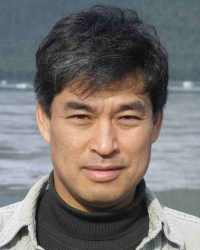- Speaker
- Prof. Hong Qian
- University of Washington, Seattle
- Abstract
There is a growing awareness toward a slow shifting in the foundation of the thermodynamic laws, from several macroscopic, empirical postulates concerning heat as a form of random motions, to derivable mathematical theorems based on stochastic dynamics of mesoscopic systems. It becomes increasingly clear that a stochastic dynamic description of the Nature is a very effective mathematical representation of the Reality. In this talk, I shall first introduce this mathematicothermodynamics as a set of mathematical results, and then apply them to two significant problems: (1) The Gibbsian macroscopic isothermal chemical thermodynamics via a mathematical limit by merely allowing the molecular numbers to be infinite; (2) A lift of a finite Markov process with irreversible cycles to an infinite system that establishes, in the long-time limit, the entropy production in the former is equal to the potential energy decrease in the latter. This result unifies the Clausius' and Kelvin' s statements of the Second Law.
- About the Speaker
Prof. Qian received his B.A. in Astrophysics from Peking University in China in 1982, and his Ph.D. in Biochemistry and Biophysics from Washington University School of Medicine in St. Louis in 1989. Subsequently, he worked as postdoctoral researcher at University of Oregon and Caltech on biophysical chemistry and mathematical biology. Before joining the University of Washington, he was an assistant professor of Biomathematics at UCLA School of Medicine. Prof. Qian's main research interest is the mathematical approach to and physical understanding of biological systems, especially in terms of stochastic mathematics and nonequilibrium statistical physics. In recent years, he has been particularly interested in a nonlinear, stochastic, open system approach to cellular dynamics.
- Date&Time
- 2018-07-19 2:00 PM
- Location
- Room: A203 Meeting Room




